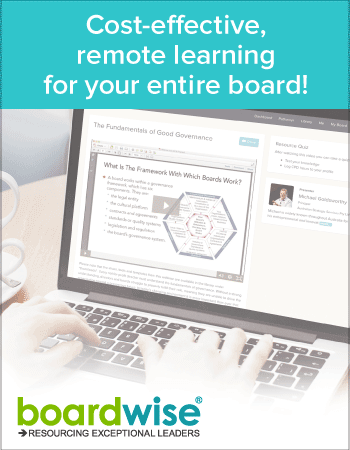governance
Adaptive Directorship: Creating Organisations that Flourish in Unpredictable Environments
Published: May 8, 2017
Read Time: 11 minutes

The following is intended to be the beginning of a discussion: A pathway to opening up the discourse on what attributes, beyond pure technical skills, individual boards must possess in order to help their organisations thrive in a world that is constantly changing and is, to put it simply, unpredictable. This is not meant to be prescriptive, but rather to present ideas to get you thinking about what practising the emerging concept of Adaptive Directorship might mean.
What is Adaptive Directorship?
Adaptive Directorship is a form of governing that is focused on building resilient and adaptive organisations that not only manage to survive in inherently unpredictable environments, but thrive and flourish.
Adaptive Directorship is about principles and practices, mindsets and structures that allow boards and directors, both a key lever in organisational success, to match their decision-making capabilities to the velocity and cadence set by the external environment, or to exceed that external environment’s pace.
Why Adaptive Directorship?
The current practice of governance or directorship is by no means broken or obsolete, but it is under pressure, straining, beginning to crack. Directors, boards and their organisations are increasingly struggling to navigate unpredictable external environments with tools, skills, methodologies, theories and structures from times past. It is time to rethink what is required – to take the best of what has worked and to combine it with new ways of thinking and operating. Adaptive Directorship is about opening up the discussion of what works and what doesn’t and pairing it with what could work, and what might be now and in the future.
The ability to rapidly and effectively adapt to change is a key trait that organisations require in order to be able to survive in an unpredictable environment.
When talking about building flexible and adaptive organisations that have the capacity to cope with an unpredictable environment, the discussion tends to focus on the operational layers of an organisation. However, as much as this is important, this neglects one of the biggest drivers of organisational direction, focus and ability to change: the board of directors.
The board is a key lever for an organisation’s appetite for and ability to change, particularly in relation to the speed and cadence at which it can embrace that change. If the board mandates a slower cadence or hires a chief executive officer who is inherently set for a pace that is different from what is required to survive in a rapidly changing environment, then this directly impacts the organisation’s ability to flourish when faced with rapidly evolving variables.
Creating an organisation that is adaptive requires that the board practice Adaptive Directorship. To practice Adaptive Directorship, the board and, more specifically, individual directors must themselves develop or possess behaviours that support Adaptive Directorship in their boardroom, which will in turn support the creation of an adaptive organisation.
But what traits should directors wishing to embrace Adaptive Directorship possess or aim to develop?
Strong Opinions, Loosely Held
The ability to change is a key part of being adaptable, however, change for the sake of change or flip-flopping is not something we want to cultivate in a boardroom. Adaptive Directors need to have strong opinions – based on facts, experience and knowledge.
However, they must be willing to change these opinions when the environment around them changes – when new facts, experience, information or a more developed and well thought through viewpoint using those same indicators is articulately and convincingly presented to them.
Most directors currently have the strong opinions part sorted out. What they lack is the awareness or willingness to change their opinion in the face of new insights or facts. This presents a significant problem in business environments that are unpredictable. Unpredictable environments are changing all the time – new competitors come along, technology helps new opportunities emerge or the fundamental way business was conducted changes. Thus your opinions and views must be regularly reviewed and subsequently updated. This necessitates being willing to change your opinion or view on an issue. For example the introduction of the National Disability Insurance Scheme and a move to Consumer Directed Care in the health and aged care sectors is rewriting the long-time rules of a well-established industry. Directors in this industry must re-evaluate their stance on almost every issue around the board table as what has worked in the past will not work in the future.
You’ve probably heard the saying: “The definition of insanity is doing the same thing over and over again, but expecting different results” – not changing your opinion or view when new facts or information come to light is basically like doing the same thing over and over, it will get you nowhere and in this case instead of going insane, it will lead to your organisation going the way of the dodo.
Of course there are underlying or timeless principles that directors probably shouldn’t change their minds on, however, it is important not to confuse opinion with facts or principles.
Strong Self-Awareness
Directors must know their strengths, weaknesses and hot buttons. They should also be aware of where they can make effective boardroom contributions and where it is better to step back and allow others to contribute or guide the decision.
An adaptive director is highly self-aware. Self-awareness is not generally a trait that has been explicitly sought in directors, but it makes sense when you think about the types of activities that a director must engage in. Directors are not lone wolves, they must successfully integrate and work with a group of other people in reaching decisions. This necessitates that they have an understanding of what they do and do not (or can and cannot) bring to the boardroom. How often have you been in a board meeting and had another director over-contributing and therefore over-complicating an issue, whereas if they stepped back the issue could have been resolved quickly and effectively?
Directors must understand their unique strengths in order to contribute effectively to the boardroom and they must also understand their unique weaknesses. A robust understanding of strengths and weaknesses allows effective contribution. Without this understanding directors will waste time and energy – their own and that of others.
Directors should also have self-awareness with respect to what their hot buttons are – what really gets them fired up or seeing red. Hot buttons could be reactions to an issue, the person presenting the issue or even the way the person presents the issue under discussion. Cultivating a good understanding of these hot buttons can help a director keep themselves on an even keel rather than taking the discussion down a side road by engaging in a pointless or sidebar debate simply because they saw red.
Cultivating a high level of self-awareness will allow directors to contribute to decision-making in precise and meaningful ways, allowing the board to make decisions more effectively and at a cadence that is required to navigate the organisation’s external environment and engage with change at the rate required.
Bold Mindset
One of the board’s core roles is to consider what could be, rather than what is. While the board must undertake assurance and the necessary ‘what if’ questioning that helps it to manage risk and therefore necessitates the “ticking of boxes” (in the traditional governance and oversight sense), the role of the board cannot simply be “box ticking”. The board must engage in anticipating what the future state of the organisation will look like. To do this effectively directors must have a bold mindset. A bold mindset means saying we need to aim for a 10X improvement rather than a 10% improvement on the current state of affairs.
A bold mindset is required to be able to come up with effective solutions to wicked problems. It means sometimes making a hard choice for the long-term good of the organisation, rather an easy choice that is focused on the short term. It means setting goals that are aggressive and will push the organisation to new heights.
This 10X thinking is what allows an organisation as a whole to strive for a bold vision for what the future might look like. Setting a bold vision and then ensuring the effective communication of this vision allows the entire organisation to rapidly adapt to new challenges when faced with an uncertain external environment.
Candour
As human beings, most of us aren’t hardwired to be completely open, honest and frank – we want others to like us and we want to be one of the group. In the boardroom this is a particularly thorny problem because without frankness or openness, issues are likely to be glossed over or the board will believe that everyone is in agreement when this may not be the case.
When directors are unable to be candid about their views or insights on an issue, decisions will be of a lower quality, or worse, groupthink can seep in. In rapidly evolving environments groupthink and a lowered decision quality will severely impact the end results.
The biggest hurdle with being frank can be that others may be offended if they interpret what you say as a personal attack. To avoid this, directors should adjust their language to focus on the issues rather than the individual exposing a particular point of view.
Boards as a whole need to encourage candour in their directors. Encouraging directors to be open, honest, frank and candid often forms part of the role that an effective chairperson plays in encouraging Adaptive Directorship to take root in the boardroom.
Deep Understanding of Governance
“We don’t rise to the level of our expectations, we fall to the level of our training.” – Archilochus
In times of change and turmoil we are more likely to revert to what is tried and true, what we know will work. This is particularly true with boards and directors, especially when we don’t utilise governance knowledge or flex our strategic muscles in our day-to-day work or lives, but rather once a month (or less) every time the next board meeting rolls around.
The shallower your knowledge of governance, the more likely that you will fall back to that base level during times of rapid change or pressure, essentially meaning you will find it very difficult to be adaptable as a director. Many directors have undertaken various courses and training and subsequently feel that they know all they need to know. However, the majority of courses available are simply the “minimum requirement” to be at the table – in competitive racing terms, the standard qualifying time to participate in the race.
This is why it is so important for boards and directors to engage in ongoing professional development activities. These activities allow directors to expand their knowledge of governance and when they inevitably fall to the level of their training, that extended training will sustain them and assist the board and the organisation to be flexible in its decisions or methodologies and ultimately to thrive.
Expert Generalist
As a director it was once enough that you could simply be a lawyer or accountant. Today not only do we need diverse professions represented around our board tables, we need professionals who have more than just a deep knowledge of their own profession. Directors need a breadth of knowledge from across multiple disciplines, a fundamental understanding of principles that underpin more than one area of knowledge and an ability to apply those fundamental principles in unique ways, both to their own domain of specialty knowledge and also to other domains of knowledge.
Humility
Humility is the most important of all the traits an Adaptive Director must possess as it supports all previously mentioned traits, and fosters a vital characteristic all directors should possess – curiosity. Curiosity is also the seed of creativity and nurtures the thirst for learning.
True humility breeds curiosity and curiosity is a trait that is truly needed in the boardroom. Being genuinely curious allows you to ask powerful questions. The ability to ask powerful questions is the number one skill that every director must possess. Asking powerful questions leads to being able to get to the heart of issues faster, which aids significantly in decision-making in the midst of unpredictability.
Unfortunately, there is another trait many directors possess in abundance that drives out the capacity for humility: unchecked ego. Some ego can be a good thing, it can drive strong leaders and allow people to act with confidence. But unchecked ego, particularly in the group setting of the boardroom (where there may be multiple egos), leads to destructive behaviour.
An unchecked ego also destroys the capacity for candour, bold thinking, strong self-awareness and the loosely held part of “strong opinions, loosely held”. It makes it difficult to have a truly deep knowledge of governance because ego can make many directors believe they know it all already.
Unchecked ego can make it difficult to unlearn what we have learned and thereby increase our capacity to learn. As counterintuitive as it sounds the key to learning is unlearning. Being unwilling to unlearn is driven by a fear of the unknown and of abandoning what has worked well in the past. Ego impedes the ability to receive feedback and the ability to let go of previously held assumptions. It drives people to hang on to preconceived notions about the world. Ultimately, it impedes the ability of a director to be curious.
Conclusion
A key responsibility of any director is to ensure their organisation is healthy enough to survive in the future. This seems simple enough, but it requires that each director make high quality decisions that keep the organisation in a healthy state. A way to make high quality decisions is to have a healthy mindset and way of thinking that naturally allows quality decisions to be made. The traits in this article, core to the practice of Adaptive Directorship, support a healthy mindset and in turn support an adaptive organisation. Cultivating these traits in individual directors helps each director to fulfil their responsibilities more effectively.
Share this Article
Recommended Reading
Recommended Viewing
Author
-
Managing Director
- About
-
Raphael is the Managing Director of Better Boards Australasia. He regularly writes and speaks on leveraging the power of business for social good, governance, leadership, technology and not-for-profits. During his time at Better Boards, Raphael has helped hundreds of not-for-profit directors and executives on their journey to master the Art & Science of the Boardroom. When he’s not in the office Raphael can be found on mountain biking tracks around Australia and New Zealand.
Found this article useful or informative?
Join 5,000+ not-for-profit & for-purpose directors receiving the latest insights on governance and leadership.
Receive a free e-book on improving your board decisions when you subscribe.
Unsubscribe anytime. We care about your privacy - read our Privacy Policy .










